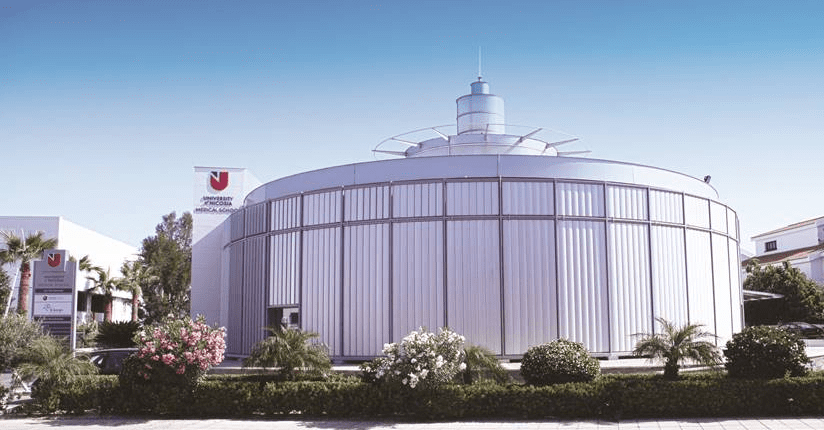University of Nicosia Medical School in Cyprus
General Objectives University of Nicosia Medical School in Cyprus
This programme of study provides students with the opportunity to receive high quality education in Medicine. The general programme objectives are to:
- Train students to become highly competent physicians and equip them with the knowledge, skills and attitudes that will enable them to respond to the challenges of modern medicine.
- Produce competent and caring graduates, safe to practise initially as junior doctors, and with the potential to develop fully their careers in their chosen branch of medicine.
- Provide each student with the evidence-based knowledge and experience necessary to advance both scientifically and humanistically in the care and treatment of those who are ill including immediate care of medical emergencies.
- Foster the development of lifelong commitments to scholarship and service toward individual patients and the community.
- Encourage students to practice medicine holistically including ethical, legal, psychological and social considerations.
- Promote health and wellness through disease prevention and research.
- Contribute toward the establishment of Cyprus as a regional centre of excellence in medical education.
Knowledge and Understanding University of Nicosia Medical School in Cyprus
Upon completion of the programme students should be able to:
- Demonstrate knowledge of the basic, clinical, behavioural & social sciences, ethics and jurisprudence which are relevant to the study of medicine and be able to apply such knowledge in clinical practice e.g. in health promotion, disease prevention, diagnosis, treatment and rehabilitation.
- Demonstrate knowledge of the principles and practice of public health in both individuals and populations, and acquire the ability to implement appropriate measures, independently and with others in the promotion of health, the prevention of illness and the treatment of disease.
- Demonstrate problem-solving, critical thinking, and analytical skills in basic and clinical sciences, including research and evidence-based medicine needed for decision-making in the practice of medicine.
- Exhibit ability to integrate socio-economic and ethical issues along various phases in learning related to the practice of medicine and management/ treatment modalities.
- Recognise the importance of the therapeutic nature of the patient-doctor relationship and the impact on that relationship of the individual characteristics of both patient and doctor.
Skills University of Nicosia Medical School in Cyprus
Upon completion of the programme students should be able to:
- Communicate clearly, sensitively and effectively with patients and their relatives, with colleagues from relevant multidisciplinary professions and with communities.
- Impart appropriate, relevant and correct information to patients, colleagues and communities in a coherent and clear manner.
- Listen effectively to patients, respond to their communication needs and explore their concerns and expectations.
- Demonstrate competency in a range of clinical and investigative skills safely, sensitively, independently and with confidence, to a predetermined standard.
- Demonstrate a logical approach to solving patient problems, from history data, physical examination findings and results of investigations, and use this information to make differential diagnosis and form management plans.
- Keep accurate clinical records based on their own observations and communicate their findings to others clearly and concisely.
- Demonstrate skills in the recording, organisation and management of information including the use of appropriate information technology.
- Recognise and manage life-threatening conditions and provide immediate care of medical emergencies, including First Aid and resuscitation.
- Prescribe drugs safely under supervision, including dosage calculation, prescription writing and administration
- Critically appraise information extracted from appropriate information from a diverse range of resources, including library and on-line information (internet, intranet, on-line databases), with emphasis on evidence-based or best practices.
- Recognise and fulfill the obligation to educate patients, colleagues and the communities.
- Work with members of a multidisciplinary team and understand their own personal roles and responsibilities within the team, as well as those of the other healthcare professionals.
- Show qualities of organisation, including prioritisation of workload and time management, with a sense of entrepreneurship.
- Demonstrate strategies for preventing, and coping with, stress.
Behaviour – University of Nicosia Medical School in Cyprus
Upon completion of the programme students should be able to:
- Ensure the care and safety of patients is central to their everyday practice.
- Accept the moral, ethical and professional responsibilities involved in providing care to individual patients and communities, including concern for confidentiality and respect for individual autonomy
- Respect patients, regardless of their lifestyles, culture, beliefs, religions, race, colour, gender, sexuality, disability, age, and social or economic status.
- Respect the right of patients to be fully involved in decisions about their care, enabling patients and families to make informed decisions in relation to their treatment, including the right to refuse treatment or to refuse to take part in teaching or research.
- Recognise own limitations, accept criticism when justified and know when to ask for help.
- Adopt an empathic and holistic approach to patients and their problems.
- Understand and uphold principles of honesty and trustworthiness.
- Recognise a duty to protect patients and others by taking action if a colleague’s health, performance or conduct is putting patients at risk.
- Behave in a professional manner at all times, by being punctual, reliable, honest, respectful, courteous, and well-presented.
- Recognise the impact of your own health on your ability to practise medicine, and respond appropriately.
- Keep up-to-date through self-directed learning and recognise that medical education is a lifelong process.
- Work cooperatively as a member of a team, accepting and providing leadership as appropriate.
HOW TO APPLY: University of Nicosia Medical School in Cyprus
The applicants are required to complete the on-line application form.
Or if you have any questions, you can contact Dr. Nina Dimitra on
M +30 697 26 43 698 (Viber or WhatsApp) daily from 10 am to 8 pm Central European Time.
Compare Tuition Fees Of Medical Universities





